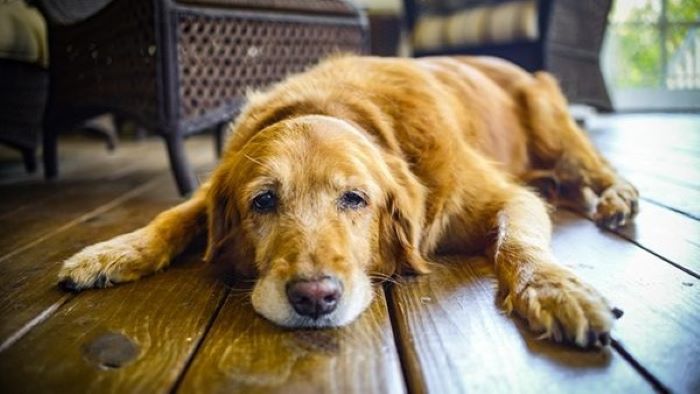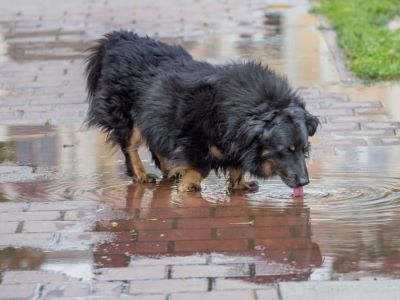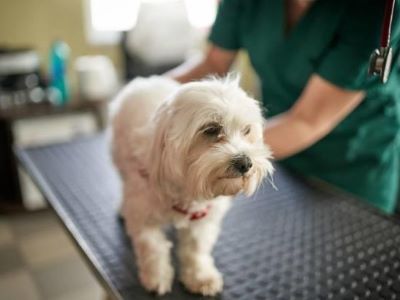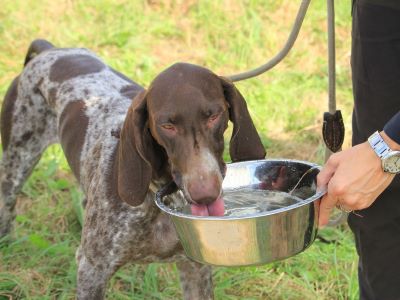Diarrhoea and vomiting in your dog are always concerning. There are many potential causes of gastrointestinal distress, but one of the most common culprits is a single-celled parasite called Giardia. This tricky protozoan sneaks up into your dog’s small intestine and causes havoc. But how can you detect Giardia in Dogs?
Giardia disrupts the digestion cycle and nutrient cycle. The parasites can attach to the intestinal wall and multiply, releasing cysts that are passed in stool. Your dogs contract Giardia from ingesting the cysts from contaminated environments. Once they are infected, they develop symptoms such as diarrhoea, greasy-looking stool, dehydration, weight loss, lethargy, and other similar problems.[1]
As alarming as this sounds, Giardia is a treatable condition. With a proper diagnosis from a veterinarian and a round of prescription medication, most dogs make a full recovery. Owners can also take preventive steps to reduce exposure. The key is being informed about the parasite, its spread, and how to treat it.
In this article, you’ll get an overview of Giardia in dogs. Let’s see how dogs get infected, what symptoms to look for, how vets treat the parasite, treatment options, and prevention advice.

Transmission – How Dogs Get Infected With Giardia

So basically, dogs get giardia by swallowing microscopic parasite cysts. The cysts are found in the poop of infected animals. Giardia cysts spread easily in the places where dogs usually gather around or go for walks.
Dirty puddles or ponds often contain giardia. The protozoans can live in cold water for months. Dogs can pick up cysts from sniffing or licking infected poop. Crowded areas like shelters or kennels make it easy for dogs to get infected poop in their mouths. Cleaning up a poop quickly reduces spread.
For instance, puppies catch giardia a lot since their immune systems are still developing. They can even get it from their mom’s milk. Adult dogs with weakened immunity also struggle to fight off giardia.
Owners can take steps to protect their dogs by themselves. They should pick up all poop, especially in public spaces. Dogs should be provided with clean drinking water. They should also limit contact with places where giardia could be lurking (garbage cans or potholes).
Symptoms – How to Tell If Dog Has Giardia

Giardia infection causes a range of upset stomach symptoms in dogs. These are the most common symptoms and probable signs of illness for your pooch. Some more signs that you should look out for your dog are[2]:
- If the dog poop is loose or its having diarrhoea
- If the poop that is grey, yellow, or looks greasy
- If your dog has started abruptly losing weight
- If your dog is throwing up frequently
- If your dog always feels tired
- If stomach pain is a constant thing for your dog
Some dogs get gassy or bloated for a long time before showing any symptoms. Puppies could also have blood in their stool. If this happens, it will become a serious issue and will need your veterinarian’s check-up.
Dogs with giardia will have good and bad days. They can seem better for a while and then get diarrhoea again. This happens because the giardia bugs in the gut change into different forms.
Giardia makes it hard for dogs to absorb nutrients from food. So they can become malnourished. Puppies have the most trouble gaining weight.
Not every dog with giardia gets sick. Some carry the bugs but look healthy. But most dogs will have tummy troubles if infected.
Owners should watch for any vomiting, diarrhoea, or weight loss in your dog. This could mean your dog can be infected.
Diagnosis of Giardia

If your dog has Giardia, the common symptoms will be diarrhoea or weight loss. The veterinarian will be checking its poop for the parasite. The stool would be then checked under a microscope. If there are any signs of the parasite’s cysts or trophozoites in the same, your vet would know.
If your dog has been diagnosed with Giardia that means your vet has found the parasite in the stool sample. Generally, veterinarians use antigen tests on the faeces. This involves mixing the stool with a liquid solution. If Giardia is present, it will react with the solution. The vet can use test strips to check for a colour change.
Microscopes give the clearest view of the actual parasites. However, antigen testing is faster and also reliable. Your vet may do both to check for giardia from multiple angles. Bringing a fresh stool sample to the vet’s office is however important. Giardia cysts start breaking down outside the intestines, so old samples may not show the parasite.
Checking poop is the best way to diagnose giardia. If the parasite is detected, the treatment should start without wasting any more time. Catching it early improves recovery speed for your dog.
Treatment for Giardia

If the test results are positive and your dog is suffering from Giardia, the veterinarian will prescribe medications to kill the parasites living inside your dog. Some of the common medications for treating Giardia are here as follows:
- Metronidazole – Antibiotic that treats giardia and intestinal inflammation. It should be given orally to the dog.
- Fenbendazole – Deworming medication that also targets giardia. It comes as pills or liquid for the dog.
- Nitazoxanide – Antiprotozoal drug that stops giardia from multiplying. It should be given with food.
- Other antibiotics like quinacrine may also be used.
The prescribed medications are for 5-10 days. This fully clears Giardia from the dog’s system. Later, follow-up tests are done to confirm the parasites are gone.
The treatment also focuses on easing the symptoms and restoring nutrients. Dogs should get sufficient fluids to prevent dehydration. Vets recommend bland diets like rice and chicken to let the gut rest. Vitamin supplements are prescribed to recover from malnutrition.
With prescription meds and supportive care, most dogs fully recover from Giardia. Symptoms improve within a few days, though it takes longer for the intestines to heal. Complete recovery can even take several weeks.
Prevention of Giardia

How do you prevent from this happening to your dog? Or How can you prevent this from happening again? There is a solution to every problem. You can follow a set of rules every time you take your dog out. Dog owners can take to lower the risk of Giardia Infection by following these steps:
- Pick up your dog’s poop right away, especially in parks or trails. Get rid of it in trash cans. This stops cysts from spreading.
- Give your dog clean, filtered water. Don’t let them drink from puddles, ponds, or other stagnant sources.
- Clean the food and water bowls daily with soap and hot water. Don’t share bowls between dogs.
- Bathe or wipe down your dog after they visit any muddy or wooded areas.
- Keep dogs away from questionable water sources like streams.
- Clean up accidents inside the home thoroughly. Use disinfectant to clean any cuts or wounds properly.
- Ask kennels or daycares about sanitary practices. Look for clean conditions.
- Get your new dog or puppy tested for Giardia first before carrying it home. Isolate them before introducing them to any other dog in the community if they show any primary symptoms.
- Never allow your dog to eat faeces, it would solve the majority of your problems.
Taking some basic sanitary steps can greatly lower risks for your dog to Giardia. Stay vigilant about good poop hygiene and cleanliness in your dog’s environment. Ask your veterinarian for any other tips and suggestions to protect against protozoan parasites.
FAQs
What are the symptoms of Giardia in Dogs?
Common signs are diarrhoea, greasy-looking stool, weight loss, vomiting, abdominal pain, and lethargy. Symptoms tend to fluctuate in severity.
How do dogs get infected with Giardia?
Dogs become infected by ingesting Giardia cysts. The main sources are contaminated soil, water, or faeces. The parasites can spread between dogs in unsanitary conditions.
How is Giardia diagnosed in dogs?
Vets diagnose Giardia by testing a stool sample under a microscope to look for cysts. Antigen-testing stool samples can also detect the parasite.
Can Giardia infect humans?
Yes, humans can develop giardiasis through ingesting cysts from contaminated sources. Practising good hygiene around dogs reduces risk.
Is Giardia a serious problem in dogs?
Giardia can cause chronic illness if untreated. But with prompt diagnosis and medication, most dogs fully recover within a few weeks.
Conclusion
Giardia is one of the most common intestinal parasites infecting dogs today. This stubborn protozoan attaches to the intestinal wall and causes nutrient absorption problems, diarrhoea, dehydration, and weight loss. Knowing how Giardia spreads and the steps for diagnosis and treatment will be a safety layer for dog owners.
While Giardia requires vigilance, the outlook for infected dogs is positive. With prompt veterinary care and correct medication, dogs recover fully within a few weeks. Preventive actions like cleanliness, hygiene, and avoiding contamination can reduce transmission. Limiting Giardia’s spread protects all dogs in the community.
Giardia can be stressful and disruptive when a beloved dog gets ill. But dog owners can have a moment of relief knowing that the parasite is treatable, manageable, and preventable. By informing themselves about Giardia and working closely with their veterinarian, you can be the best protection against this stubborn parasite.
References:
- Giardia in Dogs | VCA Animal Hospitals
- Giardia: Infection, treatment and prevention | Cornell University College of Veterinary Medicine



